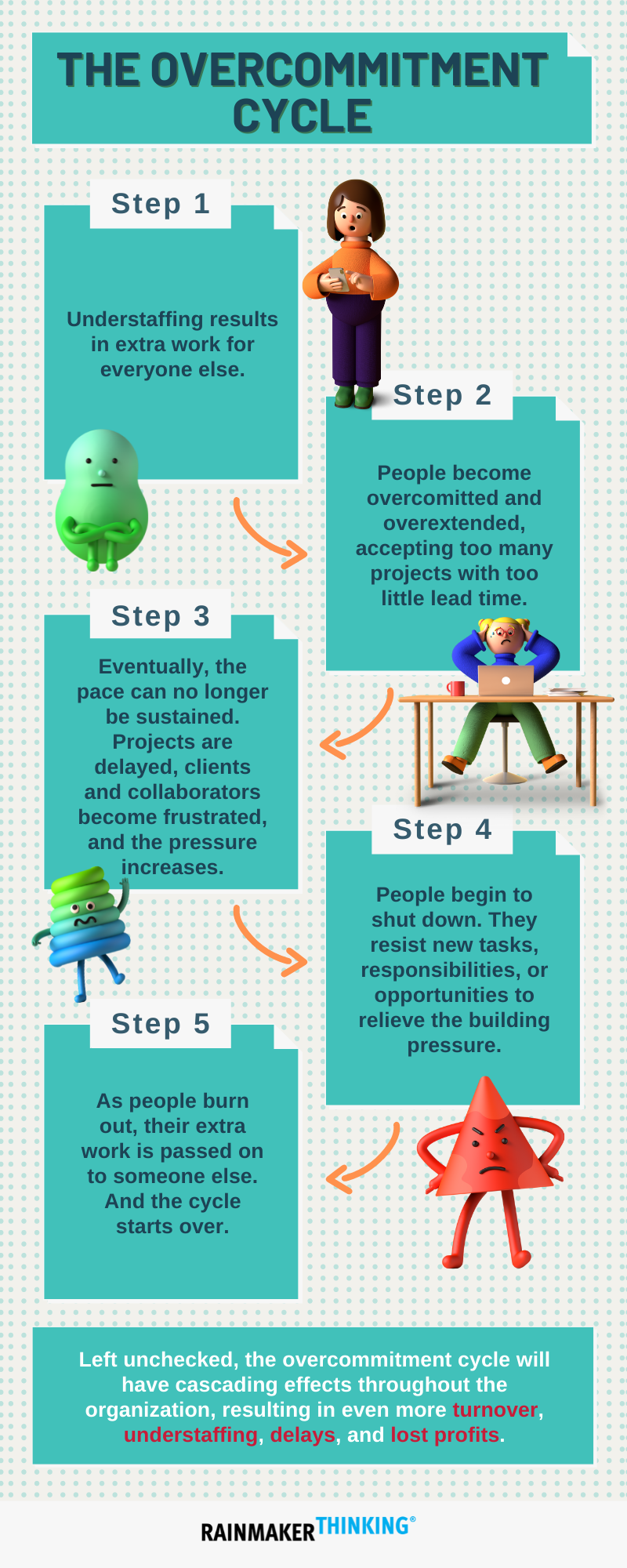Blog
Employers: Beware the consequences of the overcommitment cycle
If you want to stop turnover and prevent people from quitting, as an employer, you must fight overcommitment syndrome within your ranks.
This is the toxic cycle: When an organization is understaffed, the extra work inevitably must fall to someone. Everything is urgent and important. People overextend themselves, committing to too many projects with too short lead times, and this may even work for a little while. But no one—even the most committed, hardest-working individuals—can sustain that pace forever.
Eventually, they’re going to drop some balls. Projects are delayed. Clients, customers, and collaborators are left frustrated. So, they increase the pressure. But once the pressure builds up, people begin to shut down. They resist new tasks, responsibilities, and opportunities as a way to relieve some of that pressure. If they don’t, the stress builds to burnout. And then they truly have no choice but to step back for an extended period of time. Their work gets passed on to someone else…and the cycle starts all over, cascading throughout the organization.
The solution for employers is not to find ways for everyone to work less, or to encourage vague ideas about self-care, while simultaneously expecting more from everyone. The goal is to conserve, protect, and manage productive capacity in today’s high-pressure, high-collaboration workplace. It’s about helping everyone work a lot smarter so they can take back control of their time.
As an employer, yes, it is your job to get people focusing on the right things, at the right times, for the right reasons.
The hard truth you have to accept is that in order to take control of turnover in the short-term, you must commit to a long-term solution. Tweaking your financial incentives and offerings might be a way to fill the gaps, but it’s not likely you’ll find many lasting employees that way.
So, play the long game as an organization by empowering your people, in the long-term, to:
- Align, align, align. Extreme alignment is basically this: staying in alignment with your boss, your direct reports, and your colleagues in the organization. It sounds simple. You may even believe you’re already doing all you can to be aligned in this way. But what I have seen, over and over again, is that teams who believe they are sufficiently communicating with one another are often failing to communicate in a way that is structured and substantive.
- Make better choices. To avoid burnout and overcommitment in today’s workplace, your people have to be savvy about which projects they accept and which they decline. It’s not just a matter of ‘learning’ to say no! It’s about knowing when to say no, and how to say yes.
- Work smart. Regardless of where you work or what you do, if you are going to get a lot of work done very well, very fast, day after day, you need structure. The focus has to be placed on valuable execution, not mindless productivity measures.
- Continuously improve. Foster a culture of continuous improvement in your organization, and you’re likely to have higher engagement and better results from your people. But it’s not enough to tell people to make themselves better. Leaders and managers—at all levels—must be engaged in the process of coaching and supporting people in their day-to-day work and achieving their personal career goals.
- Build supportive working relationships. There are plenty of good reasons to want better relationships with your colleagues at work. Pleasant interactions with coworkers generally make your workdays more enjoyable. Trust and respect among team members opens everyone up to contribute their best ideas. And you never know which connections will lead to new and amazing opportunities for you in the future.
We can help.
We are more committed than ever to helping our clients play the long game and gain the long-term benefits.
- Enroll in our Back-To-Fundamentals Collaboration: The Art of Being Indispensable at Work Online Course
- Or, learn how an organizational assessment or training program can address your unique needs by contacting us.
